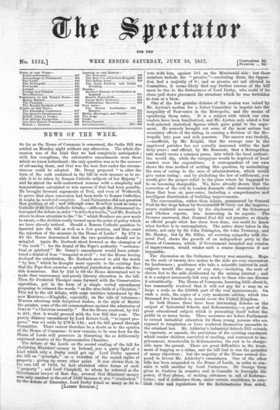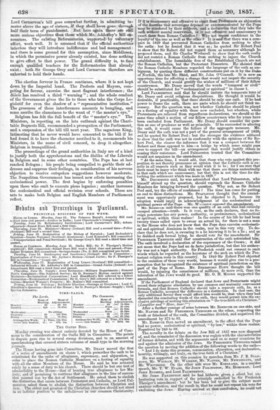NEWS OF THE WEEK.
So far as the House of Commons is concerned, the Oaths Bill was settled on Monday night without any alteration. The whole discussion was of the kind that we had completely anticipated ; evith few exceptions, the substantive amendments were those which we knew beforehand ; the only question was as to the manner of advancing them, and that was the best that under the circumstances could be adopted. Mr. Deasy proposed "to alter the form of the oath contained in the bill in such manner as to enable it to be taken by Roman Catholic subjects of her Majesty " ; and he stated the well-understood reasons with a simplicity and temperateness calculated to win success if that had been possible. He brought forward arguments of Peel, and even of Wetherell, to prove that since concession had, been made to Roman Catholics, it might be renaerea oninplatn_ Lord Palmerston did not question that position at all ; and although some Members tried to rale° a Catholic or an Anti-Catholic debate,—although Mr-Drummond interrupted the debate in order "to tell a few truths," and Mr. Roebuck strove to draw attention to the " lie " which Members are now made to swear,—the division really turned upon the point of policy which we have already noticed. Should a Roman Catholic question be inserted into the bill as well as a Jew question, and thus court the rejection of the measure in the House of Lords ? By 373 to 83 the House determined that the two questions should not be mingled. Again Mr. Roebuck stood forward as the champion of "the truth": for the denial of the Pope's authority "ecclesiastical or spiritual" Mr. Deasy's amendment would have substituted a denial of it as "temporal or civil " ; but the House having declined the substitution, Mr. Roebuck moved to add the words "by law," which he thought more apposite to the existing fact that the Pope does exercise a spiritual jurisdiction within the British dominions. But by 243 to 68 the House determined not to snake that unnecessary and purely literary alteration in the bill. Then Sir Frederick Thesiger came forward with the Conservative opposition, put in the form of a simple verbal amendment proposing to reinsert the words "on the true faith of a Christian." This led to the old debate, with SOISS varieties introduced by the new Members,—Kinglake, especialli, on the side of tolerance ; Warren adorning with Scriptural dashes, in the style of Martin the painter, some of the old commonplaces against the admission of Jews to "a Christian assembly." But the House resolved, by 341 to 201, that it would proceed with the Jew Bill this yeas. The purely dilatory amendment by Lord Robert Cecil, "to report progress," was set aside by 278 to 142; and the bill passed through Committee. There cannot therefore be a doubt as to the opinion of the House of Commons : it now remains to be seen how far the House of Lords will persevere in thwarting the so deliberately expressed resolve of the Representative Chamber.
The debate of the Lords on the second reading of the bill for
abolishing Ministers'-money in Ireland, was a party fight of a lind which only a Derby could get up: Lord Derby opposed the bill on "principle," as a violation of the sacred rights of property ; giving up every other point. It was shown that, in his own bill of 1833, he had abolished other forms of such " property " ; and Lord Campbell, to whom he referred as the Government lawyer of that day, avowed that Ministers'-money was only omitted in the act of 1833 because it was "overlooked." In the debate of Thursday, Lord Derby found as many as 96 to
vote with him, against 101 on the Ministerial side : but these numbers include the " proxies,"—exoluding them, the Opposition had a majority of 6; and as proxies are not allowed in Committee, it seems likely that any further success of the bill must be due to the forbearance of Lord Derby, who could if he chose pull down piecemeal the structure which he was forbidden to raze at a blow.
One of the few genuine debates of the session was raised by Mr. Ayrton's motion for a Select Committee to inquire into the inequality of Poor-rates in the Metropolis, and the means of equalizing those rates. It is a subject with which our own, readers have been familiarized, and Mr. Ayrton only added a few well-selected statistical figures which gave point to the argument. He scarcely brought out some of the most serious but secondary effects of the rating, in causing a division of the Metropolis into poor and rich quarters. The answer was twofold, —unofficial, by Mr. Knight, that the average rate in the aggrieved parishes has not actually increased within the last forty years ; and official, by Mr. Bouverie, that a Metropolitan rate would create a common purse, into which the local authorities would dip, while the ratepayers would be deprived of local control over the expenditure. A correspondent of our own shows the true method of settling this question, by assimilating' the area of rating to the area of administration, which would give union rating ; and by abolishing the law of settlement, you would give the pauper relief in the place where he happened to be on becoming chargeable. We have already shown that the correction of the evil in London demands other measures besides those that bear on poor-rates, including a comprehensive and intelligent distribution of building improvements. The conversation, rather than debate, commenced by General Peel on the steps taken by eesFernrcetit t5 carry out the improvements rendered necessary by the disclosures of the Sebastopol and Chelsea reports, was interesting in its aspects. The Premier answered, that General Peel did not perceive so clearly as official people what has since been done, nor could he know what further is in contemplation. The active share taken in the debate, not only by Sir John Pakington, Sir John Trelawny, and Mr. Henley, but by Mr. Ellice, all avowing sympathy with General Peel, shows the growth of an independent party in the House of Commons, which, if Government intended any evasion of improvement, would render such a course dangerous if not impossible.
The discussion on the Ordnance Survey was amusing. Maps on the scale of twenty-five inches to the mile are very convenient for landowners ; gentlemen who take a scientific interest in such subjects would like maps of any size,—including the scale of eleven feet to the mile desiderated by the mining interest ; and it is a subject necessarily left very much to those who can discuss it scientifically. The House of Commons, knowing little about it, has summarily resolved that it will not pay for a map on so large a scale as the 2500th part of the real measurement. On such a scale, the copies of a very moderate edition, which two thousand five hundred is, would cover the United Kingdom.
in both Houses there have been interesting debates on the subject of Industrial Schools and Reformatories,—a part of the great educational subject which is presenting itself before the public in so many forms. Three measures are before Parliament to extend industrial education for those young persons who are exposed to temptation or have rendered themselves amenable to the criminal law. Mr. Adderley's Industrial Schools Bill extends to vagrants, or amends, the provisions of the existing enactment which render children convicted of stealing, and sentenced to im prisonment, transferable to Reformatories, the cost to be chargeable upon the parent. There are great difficulties in the treat
ment of begging as a crime, and the bill had to run the gauntlet
of many objections ; but the majority of the House seemed disposed to favour Mr. Adderley's earnestness. One of the other bills has been suspended in the House of Lords, in order to con sider it with another by Lord Carnarvon. Sir George Grey gives to Justices in counties and to Councils in boroughs the
power, if they please, of making advances in aid of Reformatories; and it authorizes them, under certain conditions; to establish =lea mid regulations for the Reformatories thus aided. Lord Carnarvon's bill goes somewhat further, in admitting inmates above the age of sixteen, if they shall have gone through half their term of punishment. But here again there are still more serious objections than those which Mr. Adderley's bill encounters. The existing Reformatories, supported. by voluntary effort, work well. It is assumed that if the official authorities interfere they will introduce indifference and bad management : and there is some ground for this assumption, since Middlesex, in which the permissive power already existed, has done nothing to -give effect to that power. The grand difficulty is, to find eneugh qualified teachers for the Reformatories that already exist : both Sir George Grey and Lord Carnarvon therefore are exhorted to hold their hands.
The election fervour in France continues, where it is not kept down by the Imperial hand. The Prefects and Mayors, competing for favour, exercise the most flagrant interference,; the ASi&le has received a third " warning " ; and the whole conduct of the Government gives the lie to those who take the Corps Legislatif for even the shadow of a" representative institution." The grossness of these interferences amounts to bungling, and some ascribe the clumsiness to the want of "the master's eye."
Belgium has felt the full benefit of the "master's eye." The Ministers, in reporting on the late outbreak against the Charitable Bequests Bill, recommended a prorogation of the Parliament, and a suspension of the bill till next year. The sagacious King, intimating that he never would have consented to the bill if he had found it to have the character ascribed to it, recommends his Ministers, in the name of civil concord, to drop it altogether. Belgium is tranquillized.
The proceedings of the grand authorities in Italy are of a kind to justify both the apprehensions and the dislike of the Liberals in Belgium and in some other countries. The Pope has at last reached Bologna ; his people being compelled to garble their addresses and suppress their feelings, in consideration of his nervous objection to receive outspoken suggestions however moderate. The Neapolitan Government has issued new edicts increasing the ecclesiastical power. The first begins by enforcing penalties upon those who omit to execute pious legacies ; another inoreases the ecclesiastical and official revision over schools. These are acts to make both Belgian and English Members of Parliament reflect.



























